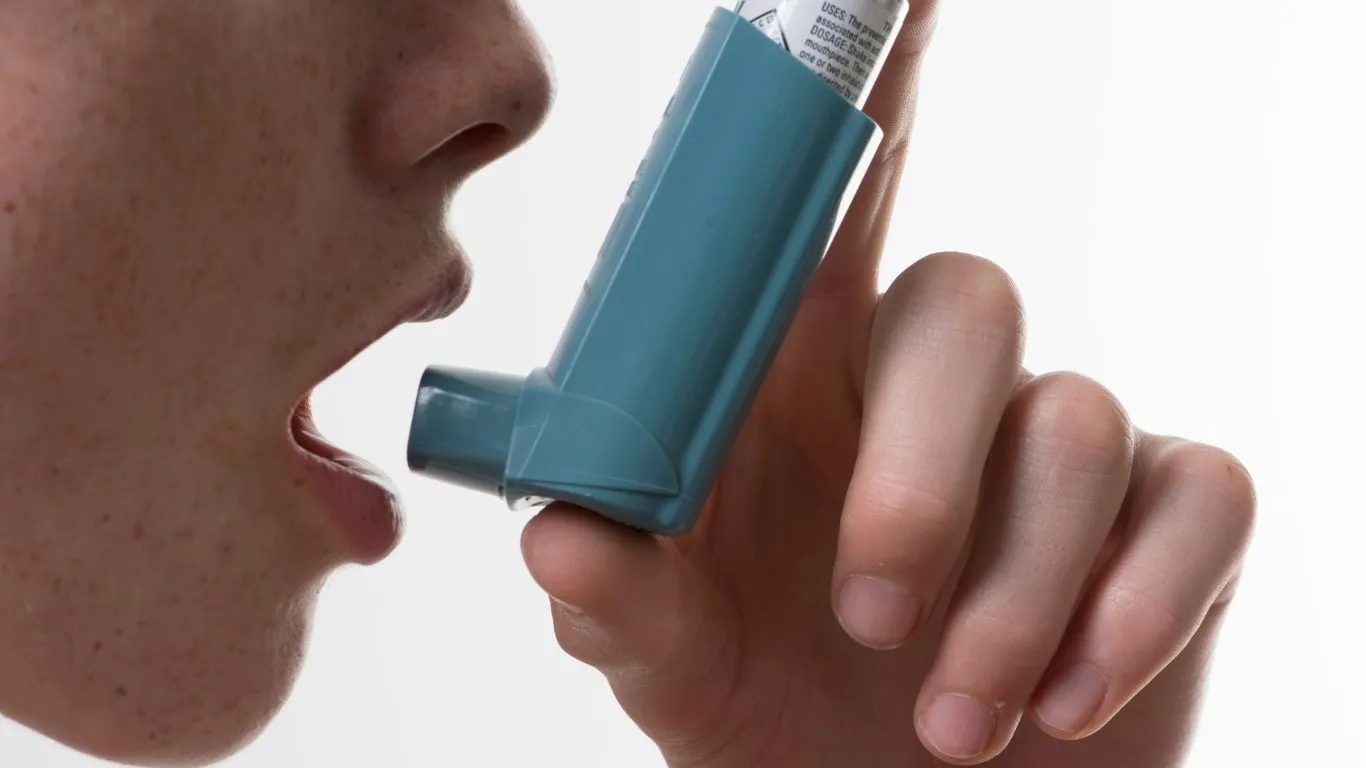Discover the Powerful Link Between Asthma and Sinusitis Today
If you’ve ever dealt with asthma and sinusitis, you probably know how frustrating it can be when those two conditions seem to gang up on you. As a pulmonary nurse practitioner, I’ve seen firsthand how the connection between asthma and sinusitis isn’t just coincidental—it’s deeply intertwined. Many people don’t realize that what’s going on in their sinuses can directly affect their lungs and breathing, making asthma symptoms worse or harder to control. This isn’t just theory; it’s a real, everyday challenge that patients face, and understanding this link can make a huge difference in managing both conditions effectively.
The Connection Between Asthma and Sinusitis: Why It Matters

So, what exactly ties asthma and sinusitis together? In simple terms, they’re both inflammatory conditions, but they affect different parts of the respiratory system. Asthma primarily involves inflammation and narrowing of the airways in the lungs, while sinusitis is the inflammation of the sinus cavities in your face. But here’s the kicker: these areas communicate more than you might think. When your sinuses are inflamed or infected, it can trigger inflammation further down in the lungs, potentially worsening asthma symptoms.
From my experience, this means patients who struggle with sinus issues often see a rise in their asthma attacks or find their usual treatments aren’t as effective. It’s like the body’s inflammatory response is on overdrive, and unless both sides of the problem—the sinuses and the lungs—are addressed, it can feel like you’re stuck in a cycle of symptoms.

One of the reasons asthma and sinusitis are so linked is because they often share the same triggers. Here are a few common culprits I’ve noticed repeatedly in my practice:
- Allergens: Dust mites, pollen, mold, pet dander—these not only irritate the lungs but can inflame your sinuses too.
- Infections: Viral or bacterial infections can start in the sinuses and quickly impact asthma control.
- Environmental irritants: Smoke, pollution, strong odors, and chemicals can aggravate both sinus and lung inflammation.
- Weather changes: Cold, dry air or sudden temperature shifts can trigger flare-ups in both conditions.
Knowing these triggers is crucial because if you manage or avoid them, you can potentially reduce the severity and frequency of both sinusitis and asthma symptoms. I always encourage my patients to keep a symptom diary, noting when flare-ups happen and what might have caused them. It’s amazing how often that simple step sheds light on hidden triggers.
The Role of Inflammation: How Sinusitis Can Make Asthma Worse
At the heart of the connection between asthma and sinusitis is inflammation. When your sinuses get inflamed, the swelling and mucus buildup can lead to congestion and blockages. But that inflammation doesn’t stay put—it can spread and cause the airways in your lungs to react similarly. This “united airway” concept explains why treating just one area often isn’t enough.
In clinical terms, the inflammation triggers immune responses that affect both upper and lower airways. That’s why someone with chronic sinusitis might experience more persistent or severe asthma symptoms. It’s a bit like a two-way street: if one side gets irritated, the other side feels the impact. From what I’ve seen, patients who get their sinusitis under control often notice a marked improvement in their asthma, sometimes reducing the need for high-dose inhalers or oral steroids.
Managing Both Asthma and Sinusitis: Practical Tips from the Frontlines

From my years working closely with patients, one thing is crystal clear: treating asthma and sinusitis separately just doesn’t cut it. Because these conditions influence each other so much, a combined management approach is often the best way forward. When I first started as a pulmonary nurse practitioner, I remember a patient who had severe asthma attacks that were frustratingly resistant to treatment. After we started addressing her chronic sinus infections aggressively, her lung function improved dramatically. It really drove home how important it is to treat the whole respiratory system as one interconnected unit.
Here’s what I usually recommend to patients aiming to get a handle on both asthma and sinusitis:
1. Keep Your Environment Clean and Trigger-Free
Reducing exposure to allergens and irritants is foundational. I often tell patients to think of their homes as “safe zones.” Here are some practical steps that have worked well:
- Use high-efficiency particulate air (HEPA) filters in your bedroom and living areas.
- Wash bedding weekly in hot water to minimize dust mites.
- Keep pets out of bedrooms if pet dander triggers your symptoms.
- Limit use of strong chemical cleaners or scented products that can irritate your airways.
In my experience, patients who implement these simple environmental tweaks often notice fewer sinus flare-ups and fewer asthma symptoms. It’s about creating a breathable, comfortable space that supports healing.
2. Don’t Skip Your Medications — But Use Them Wisely
Medications are crucial in controlling inflammation in both asthma and sinusitis, but they need to be used thoughtfully. For asthma, inhaled corticosteroids and bronchodilators remain the frontline treatments. When sinusitis is a chronic problem, nasal corticosteroids or saline rinses can help reduce inflammation and clear mucus.
From the clinic, I’ve learned that patient education is key. Sometimes people stop nasal sprays because they don’t see instant results, or they avoid inhalers fearing side effects. I always encourage patients to stick with their treatment plans and check in regularly so we can adjust dosages or try alternatives if necessary.
3. Consider Allergy Testing and Immunotherapy

Since allergens are often the common thread tying asthma and sinusitis together, identifying your specific triggers through allergy testing can be a game-changer. I’ve seen patients benefit immensely from targeted immunotherapy (allergy shots or drops), which helps their immune system build tolerance over time.
It’s not a quick fix, but for many, immunotherapy reduces the frequency and severity of both sinus and asthma symptoms. If you’ve never been tested, it’s worth discussing with your healthcare provider—especially if you notice seasonal or environmental patterns in your symptoms.
4. Pay Attention to Nasal Hygiene
You might not think about your nose much until it’s stuffed or sore, but proper nasal care can make a big difference. I often recommend daily saline rinses to patients, which help flush out allergens, bacteria, and mucus. It’s a simple step that supports sinus health and may even prevent infections.
Incorporating nasal irrigation into your routine has been a game-changer for many of my patients who juggle asthma and sinusitis. Just be sure to use sterile or distilled water to avoid introducing any harmful organisms.
When to Seek Specialist Care: Knowing the Warning Signs

While many people manage asthma and sinusitis with the strategies above, sometimes symptoms persist or worsen despite best efforts. That’s when it’s time to reach out to specialists. From personal experience, I’ve seen that involving both pulmonologists and ENT (ear, nose, and throat) doctors early on can prevent complications down the line.
You should definitely seek specialized care if you experience:
- Frequent asthma exacerbations that don’t respond well to usual treatments.
- Chronic sinus infections lasting more than 12 weeks or recurring multiple times a year.
- Severe nasal congestion or facial pain that affects your quality of life.
- Symptoms interfering with sleep such as snoring or difficulty breathing at night.
- Need for frequent oral steroids, which can have significant side effects over time.
Getting a comprehensive evaluation can include imaging tests, nasal endoscopy, or specialized lung function studies. This approach ensures treatment plans are tailored to your unique situation. In my practice, teamwork between specialties has helped many patients finally find relief when they’d been stuck in a cycle of flare-ups.
Advanced Treatments and Lifestyle Changes That Can Help

By this point, you’ve probably realized managing the connection between asthma and sinusitis requires a multi-faceted approach. Beyond basic medications and environmental controls, there are several advanced treatments and lifestyle habits that can really make a difference—especially for those of us who have battled these conditions daily in clinical practice.
Biologic Therapies: A New Hope for Severe Cases
Over the last decade, biologic drugs have revolutionized treatment options for patients with severe asthma and related sinus issues, such as nasal polyps. These medications target specific molecules in the immune system that drive inflammation. From my firsthand experience working with patients who qualify for biologics, I can say these therapies often bring life-changing improvements when traditional treatments fall short.
Some commonly prescribed biologics include:
- Omalizumab – targets IgE antibodies, useful for allergic asthma.
- Mepolizumab and Reslizumab – focus on eosinophils, inflammatory cells linked to asthma severity.
- Dupilumab – works on multiple inflammatory pathways and is also FDA-approved for chronic sinusitis with nasal polyps.
Patients I’ve seen on these treatments often report fewer flare-ups, reduced need for steroids, and better overall quality of life. However, because biologics are specialty medications, careful evaluation and monitoring by a pulmonologist or allergist is essential.
Small Lifestyle Tweaks That Pack a Punch
Aside from medical treatments, small lifestyle changes can add up to big benefits. Over the years, I’ve coached countless patients on simple habits that support respiratory health:
- Stay hydrated: Drinking enough water helps thin mucus, making it easier to clear from your sinuses and lungs.
- Practice breathing exercises: Techniques like diaphragmatic breathing or the Buteyko method can improve lung capacity and reduce asthma symptoms.
- Maintain a healthy weight: Excess weight can worsen inflammation and put more strain on the respiratory system.
- Manage stress: Stress and anxiety can trigger asthma attacks and worsen sinus discomfort, so finding ways to relax is crucial.
- Get regular exercise: Staying active helps keep lungs strong, but it’s important to avoid outdoor activities in high-pollen or polluted environments.
I always tell my patients that managing asthma and sinusitis isn’t just about medications—it’s about caring for your whole body and lifestyle.
Common Myths and Misconceptions About Asthma and Sinusitis

I’ve noticed over the years that many people have misconceptions about asthma and sinusitis, which can lead to unnecessary anxiety or poor management. Let me clear up a few of the most common myths:
Myth 1: Sinusitis is Just a Minor Nuisance
Many people shrug off sinusitis as a “just annoying” condition, but chronic sinus inflammation can seriously impact your breathing and worsen asthma. If left untreated, it can lead to persistent infections and complications that make asthma control challenging. Taking sinusitis seriously is key to managing the connection between the two.
Myth 2: Asthma is Only a Childhood Disease
Asthma can develop at any age. I’ve treated plenty of adults who only got diagnosed later in life, often triggered or worsened by chronic sinus issues. Don’t ignore symptoms like persistent coughing, wheezing, or shortness of breath just because you’re past childhood.
Myth 3: Inhalers Are Always Enough to Control Asthma
While inhalers are crucial, they don’t always address the root causes, especially if sinusitis is involved. Treating the sinuses alongside the lungs often makes inhalers more effective and can reduce the frequency of exacerbations.
Myth 4: Sinus Surgery is the Last Resort and Should Be Avoided
Surgery can be a helpful option for some patients with chronic sinusitis who don’t respond to medical treatments. I’ve seen it improve both sinus and asthma symptoms dramatically. But it’s not for everyone and should be discussed carefully with an ENT specialist.
References
- https://www.gastro.org/
- https://www.aaaai.org/ (American Academy of Allergy, Asthma & Immunology)
- https://www.thoracic.org/ (American Thoracic Society)
- https://www.entnet.org/ (American Academy of Otolaryngology)
Disclaimer
This article is intended for informational purposes only and should not replace professional medical advice, diagnosis, or treatment. Always consult your healthcare provider with any questions you may have regarding your medical condition. Individual cases vary, and only a qualified medical professional can provide personalized guidance.

Bianca Nala is a compassionate Nurse Practitioner with a strong background in primary and respiratory care. As a health writer for Healthusias.com, she combines her clinical expertise with a talent for clear, relatable storytelling to help readers better understand their health. Bianca focuses on topics like asthma, COPD, chronic cough, and overall lung health, aiming to simplify complex medical topics without losing accuracy. Whether she’s treating patients or writing articles, Bianca is driven by a single goal: making quality healthcare knowledge accessible to everyone.







